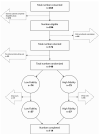A randomized trial comparing two models of web-based training in cognitive-behavioral therapy for substance abuse counselors
- PMID: 19339136
- PMCID: PMC2771721
- DOI: 10.1016/j.jsat.2009.01.002
A randomized trial comparing two models of web-based training in cognitive-behavioral therapy for substance abuse counselors
Abstract
This study compared training outcomes obtained by 147 substance abuse counselors who completed eight self-paced online modules on cognitive-behavioral therapy (CBT) and attended a series of four weekly group supervision sessions using Web conferencing software. Participants were randomly assigned to two conditions that systematically varied the degree to which they explicitly promoted adherence to the CBT protocol and the degree of control that they afforded participants over the sequence and relative emphasis of the training curriculum. Outcomes were assessed at baseline and immediately following training. Counselors in both conditions demonstrated similar improvements in CBT knowledge and self-efficacy. Counselors in the low-fidelity condition demonstrated greater improvement on one of three measures of job-related burnout when compared to the high-fidelity condition. The study concludes that it is feasible to implement a technology-based training intervention with a geographically diverse sample of practitioners, that two training conditions applied to these samples of real-world counselors do not produce statistically or clinically significant differences in knowledge or self-efficacy, and that further research is needed to evaluate how a flexible training model may influence clinician behavior and patient outcomes.
References
-
- APA Presidential Task Force on Evidence-Based Practice Evidence-based practice in psychology. American Psychologist. 2006;61(4):271–285. - PubMed
-
- Carroll KM. A Cognitive Behavioral Approach: Treating Cocaine Addition. US Department of Health and Human Services, National Institutes of Health; Rockville, MD: 1998. (Therapy Manual for Drug Addiction NIH Publication Number 98-4308).
-
- Carroll KM, Nich C, Sifry R, Frankforter T, Nuro KF, Ball SA, et al. A general system for evaluating therapist adherence and competence in psychotherapy research in the addictions. Drug and Alcohol Dependence. 2000;57:225–238. - PubMed
-
- Committee on the Developments in the Science of Learning . How people learn: brain, mind, experience, and school. National Academy Press; Washington, DC: 1999.
-
- Cucciare MA, Weingardt K, Villafranca S. Using blended learning to implement evidence based psychotherapies. Clinical Psychology: Science and Practice. 2008;15:299–307.
Publication types
MeSH terms
Grants and funding
LinkOut - more resources
Full Text Sources
Medical


